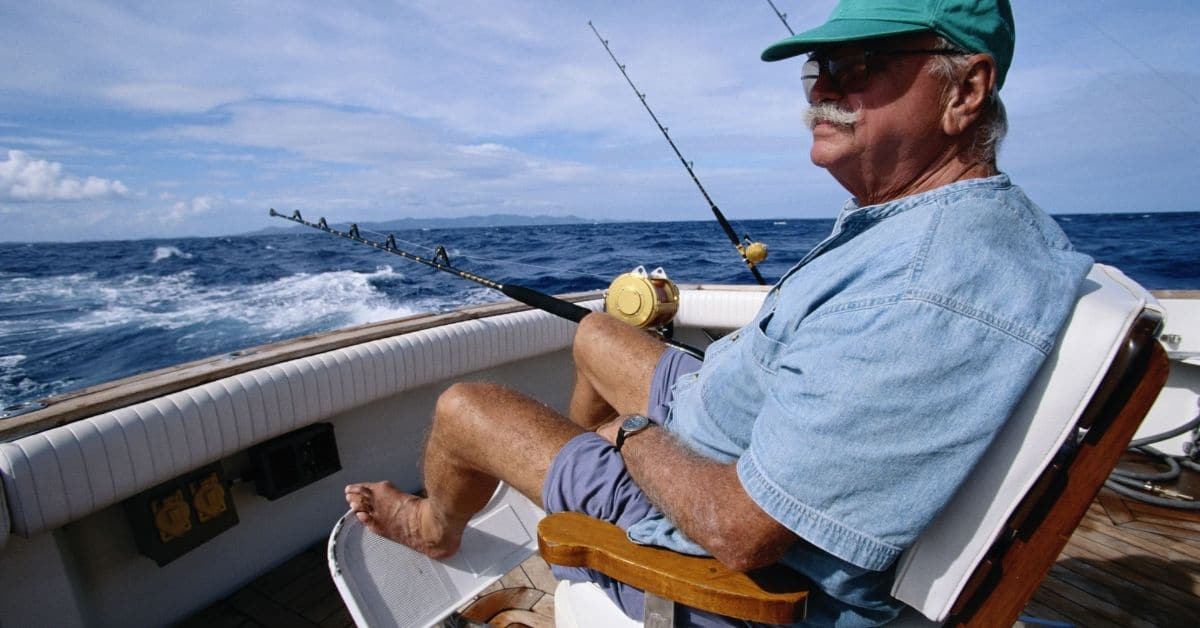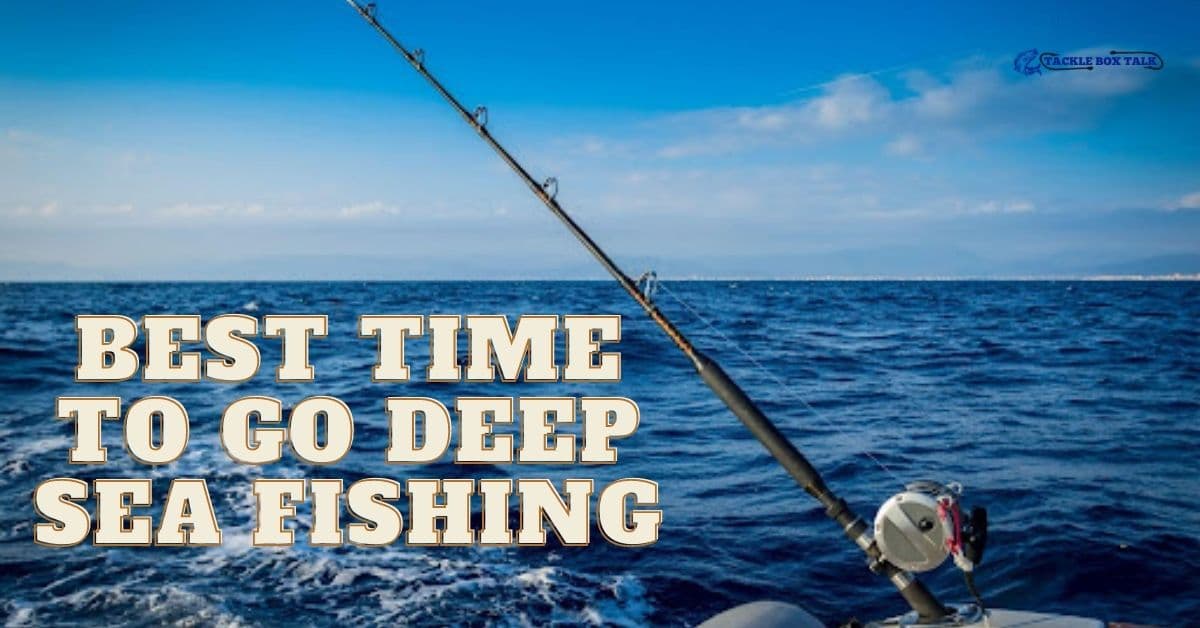Deep-sea fishing can be a very disappointing activity if done during the wrong season. And that is because the harsh weather conditions can affect the fish’s behaviors making it almost impossible to catch anything. So, if you’re wondering if this is the best time to go deep-sea fishing, you’re not alone! So we have prepared the following detailed article to help you pick the right fishing time.
Even though you can catch fish all year long, the best times to go deep-sea fishing are usually in summer and Spring. After all, the warm temperature makes the fish more active and easy to catch, but make sure you fish at dawn and dusk.
Going deep-sea fishing can affect your fishing experience and put your life in danger during the wrong season. In this article, we’ll show you when to go deep-sea fishing. We’ll also help you determine the right weather for deep-sea fishing.
When To Go Deep-sea Fishing

Finding the best time to go fishing is crucial for a successful fishing trip, including deep-sea fishing. After all, even with the best equipment, catching fish can be pretty tricky when you try fishing in the wrong season.
Unfortunately, the best time for deep fishing will vary with the place. Some of the factors that can help you determine when to go deep-sea fishing include:
- The Temperature Of The Sea
Remember, fish are cold-blooded creatures; therefore, their probability of taking a bait will depend on the temperature of the sea. Fish tend to be inactive during the cold months, and when it’s too hot, they retreat to deeper waters. The best time to try deep-sea fishing is when the water is warm after the sun sets and rises.
- Season And Time Of Day
Since small fishes that serve as prey love eating bugs, they are active when bugs are active. But when it comes to deep-sea fishing, you need to pick the right weather conditions for fishing, which means choosing the right fishing season. So the best seasons for fishing are:
Summer
Summer is the best season for deep-sea fishing, and if you avoid the hottest times of the day, you can catch some of the biggest fish in the sea. Remember, fish bite well after sundown and at dawn when the temperature is correct, and food is abundant. But during the hot days, they retreat to deeper, cooler waters.
So, the heat does play a key role when determining when to go deep-sea fishing.
Summer is the best fishing time, and even though the conditions on the boat may be unbearable, you can’t afford to miss this season.
Everything from the blue marlin to the sea bass will be biting. Plus, most bluewater fish found 50 miles offshore in Spring migrate to about 15 miles to the shores in summer. Summer also offers the best weather for offshore anglers and, at times, about five consecutive days of calm, flat weather conditions.
Summer also favors numerous creatures like squids, crabs, and anchovies that offshore fishes consume.
Spring
Another ideal season for deep sea fishing is Spring, even though the water may be cold in the morning in early Spring. So you have better luck catching something when the day gets warmer, but fishing in the morning can be a bit challenging. The best time to deep-sea fish in Spring is at dusk when the fish are active.
In Spring, you can catch bluewater fish about 50 miles offshore, so you can try seeing them at dusk.
- The Tides

Another factor that can show you when to go deep-sea fishing is the sea tides. Remember, ocean tides are usually triggered by the gravitational forces exerted by the sun and the moon and the earth’s rotation.
So the best time to fish is when the tide is falling or rising as it triggers lots of movement, forcing the fish to feed. And this is the best time to go fishing, but fishing when the tides are already high or low can be a bit challenging.
So knowing when the tides have started rising or falling can help you determine when to go deep-sea fishing. To find out when the tides are rising or falling, you can use Google’s tide chart.
- Wind
Other than the east and north wind, which lowers the water’s temperature and affects deep-sea fishing, the south and west winds have a positive effect. But, generally, the wind can be your friend when deciding when to go deep-sea fishing. The wind tends to lower visibility, making it easier for the fish to bite the bait, thinking it’s prey.
The wave action the wind produces also stirs up the food chain along the shores by pushing the food deeper into the sea. And this gives the huge fish a reason to come to the surface to feed.
Buyers Guide: 10 Best High-Performing Spinning Reels For Under $50
What Weather Is Best for Deep-Sea Fishing?

The behavior of the offshore fish species can be easily determined by the weather conditions, which affect their feeding patterns. For example, the fish become inactive when it’s too hot and prefer feeding when the temperature drops.
So, in most cases, the presence of baitfish and bugs can change everything, but if the weather conditions aren’t favorable, the prey fishes would hide. So here are some of the weather conditions that can help you determine when to go deep-sea fishing:
- Temperature
Being coldblooded, fish are affected by the water temperature, which means that the behavior of the fish can change when the temperature is too high or too low. Therefore, they can become more active when the sea is warm and swim to the deeper water when it is too cold or hot.
But the proper water temperature varies with the fish species, with others preferring low and high temperatures. For example, the largemouth bass prefers the water temperature to range between 60 and 77 degrees Fahrenheit, so you should always carry your thermometer. High temperatures are not also ideal for anglers as they can cause dehydration and sunburns.
- Rain
Light rain can help hide you from the fish and knock the flying insects to the water’s surface. When this happens, fishes tend to feed a lot, and since they can’t see you or differentiate your bait from the other insects, you are likely to catch lots of huge fish. After all, the bait fishes tend to swim to the surface and feast on the fallen bugs.
But heavy rain can force the fishes to swim deeper into the sea to avoid the cold surface waters.
- Wind
As aforementioned, wind can play a crucial role in deciding when to go deep-sea fishing. The wind stirs up the food chain by blowing the fish foods from shores into the sea, which forces the huge fishes to swim to the surface to feed. But make sure you avoid the north and south winds associated with the cold front and lower the water temperature.
FAQs
Can Heavy Rain Affect Deep-Sea Fishing?
Yes, Bony fishes with a swim bladder can be affected by the atmospheric pressure change triggered by the rainy conditions. The low-pressure systems of these fishes can make them less active because of the discomfort they cause. So the best time to fish when dealing with these kinds of fish is the day before the rain starts.
Is Deep-Sea Fishing Ideal After a Storm?
No, due to the barometric effect caused by a storm, it’s always a good idea to fish before it starts. The cold fronts brought by the storm can cause the barometric pressure to drop. When this happens, small organisms move to the surface after the air bubbles are released. And this attracts lots of fish to the surface to feed.
How Far Can You Go For Deep-Sea Fishing?
Deep-sea or offshore fishing refers to any form of fishing about 9 miles from the shores. When deep-sea fishing, you are about 20 to 30 miles into the thousands of feet deep water.
Fishing Guide: Best Bait for Surfperch
Conclusion – Best Time to go Deep Sea Fishing
Deep-sea fishing is a great adventure that can earn you some trophy fish if done at the right time. So before venturing offshores, you need to ensure the temperature, barometric pressure, and no rain are coming. If there is a forecasted storm, you should try fishing the day before the storm begins.


Cory Haasnoot
Cory is a content writer-editor and founder of Tackle Box Talk. Favorite Quote: "Give a man a fish, and you feed him for a day. Teach a man to fish, and you feed him for a lifetime."